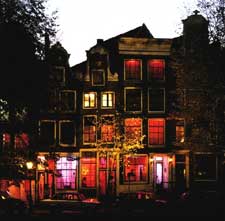 |
RADIO NEDERLAND Thursday, January 3, 2002 Arjan Schippers |
 |
RADIO NEDERLAND Thursday, January 3, 2002 Arjan Schippers |
Brothels in business
The famous Red Light District in Amsterdam is one of the main tourist attractions of the city. It's the oldest and most historic part of the Dutch capital, but the tourists are there mainly to gape at the dozens of prostitutes behind the windows. And it is not only prospective clients and curious men who come to look. Busloads full of old ladies and married couples are dropped of at nearby Dam Square to have a good look around. Surely there are prostitutes in every single country in the world, so what is so special about Amsterdam's Red Light District? It's simply that nowhere else are the women so openly on display, sitting scantily clad on bar stools behind windows. Nowhere else except in the other main Dutch cities, because this so-called window prostitution is a typically Dutch phenomenon. One in five prostitutes in The Netherlands works 'behind the windows'. Others work in sex clubs, for escort services, from home or out on the streets. Ban on brothels liftedAs in most other countries, prostitution and brothels have long been tolerated in The Netherlands. But since October 2000 they are also perfectly legal businesses, as the government lifted the century-old official ban on brothels. Prostitution never was an offence in The Netherlands, but exploitation of prostitutes by a third party was. That is no longer so, and sex club owners now have official permits and licenses to run their business as long as they stick to the rules. Proper bookkeeping is one of them. There are standards for safety & sanitation and rules about the minimal size of the rooms. But more importantly, it is forbidden to employ minors, force anybody to perform sexual acts they don't consent to, or employ women who do not possess a work permit. Local authorities may add rules of their own. They can, for example, set a limit on the number of sex establishments in the municipality, enforce planning rules, and determine opening and closing times. 
VoluntaryThe new law makes a distinction between voluntary and involuntary prostitution. This distinction provides the authorities with the instrument to regulate the sex industry, and abolish the modern sex slave trade and sexual abuse of minors, as well as combat the criminal side effects of prostitution, such as money laundering and dealing in drugs. By legalising prostitution, the government aims to protect and improve the position of sex workers and prevent illegal immigrants from going into prostitution. But will it work? IllegalIt certainly doesn't seem like it is going to work for the many prostitutes in The Netherlands from countries outside the EU. These women do not have work permits, and can't get them either. Before the new law came into force their presence was tolerated, but now they have become illegal. Many will go underground and work from home or in illegal brothels. There they remain unprotected and more vulnerable than ever, at the mercy of pimps and criminals. |
![[World 2002]](world2002crm.gif)
|
![[News by region]](../regioncrm.gif)
|
![[News by topic]](../topiccrm.gif)
|
|
Created: April 23, 2004 Last modified: April 24, 2004 |
 |
Commercial Sex Information Service Box 3075, Vancouver, BC V6B 3X6 Tel: +1 (604) 488-0710 Email: csis@walnet.org |